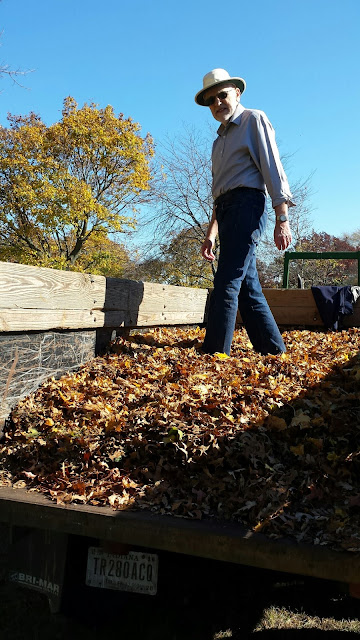Who, or what, is my falconer?
 |
| Can falcons stomp leaves? |
William
Butler Yeats wrote a poem while the horror of WWI was still fresh in
the minds of the Western World. As a high school English teacher, I
had to choose what poetry I would use to “cover” that part of the
curriculum and The Second Coming generally didn’t make the
list; I deemed it too complex, too deep, too full of strange imagery
for the high school mind to appreciate. Truth is, I’d never dealt
with it in College so I wasn’t sure I could do it any justice.
But
recently, two images from the poem have come to haunt me: the concept
of Spiritus Mundi (world spirit) and the falcon that circles
ever farther from the falconer so that a time comes when he can no
longer hear his master and having lost his centre, wanders
farther and farther out in a spiral that leads to who-knows-what.
Anarchy, possibly.
We’re
all familiar—to some degree—with Spiritus Mundi. When we
say things like “the world is going to hell on a handcart,” or
when we sing, “this world is not my home, I’m just a-passing
through,” we’re suggesting that there’s a world spirit, that
all humanity shares a common centre that’s slouching toward a
bad end. It might, of course, be clawing its way upward toward a
better, kinder future but in Yeats’ The Second Coming,
Spiritus Mundi coughs up an image that is most decidedly not headed toward anything
good. The vision, the image Spiritus Mundi provides for Yeats
is that of a beast slouching through the desert toward Bethlehem
where an alternate birth to that of Christ may be the goal.
Just
like Biblical shepherd/sheep images probably mean most to people who
know about shepherding, the falcon/falconer images in Yeats are
probably best understood by people who participate in falconry . . .
or at least have some knowledge of it. (A fascinating 3-minute film
on falconry in Abu Dhabi can be seen HERE.)
Shepherd/sheep images work well to illustrate God’s love and care
for us; falconry imagery is better at depicting our relationship to a
master who directs our choices, who is our centre. Noteworthy
in the film is the side note that even trained hunting falcons don’t
always return to the falconer; if successful, their will will be
unconditionally bent toward the falconer, their centre.
A
slogan reflecting the falconry image is often seen in churches in my
Mennonite conference: “Christ-centred, and sent.” It’s a
reiteration of centrality or focus and a reminder that the falconer’s
voice can be lost as our flight-spiral (gyre) widens. The centre
cannot hold the falcon anymore. Things fall apart.
Mostly,
we don’t give much thought to the centrality of our falconer. I’m
fascinated by the observation that our political campaigns are
arguments over what’s central and what’s not . . . and our
suggestibility in that regard. Economic growth, the environment,
healthcare, peace, equality of opportunity are suggested to be
falconers around which we ought to base our hunting. It’s not hard
to see that in such an environment, our centre may not hold indefinitely.
But
now I’m in danger of over-working a metaphor. I think, though, that
both the concept of Spiritus Mundi and the imagery of the
falconer could be excellent as starters for deciding what our centre
is and what “turning in the widening gyre” means to us. What does
it clarify when we contemplate Christ as our falconer? I know that
that question can be fraught with potential controversy: should the
falcon circle clockwise or counter-clockwise? But to a falconer, the
relationship is simple: go out there and hunt, then come back (with a
goose for supper if you can) and rest. Coming back to your centre is
the most important part.
Or
. . . love the Lord with heart, mind and soul, and your neighbour as
yourself. It’s the centre around which we circle. Or not.
I’ve
quoted the entire text of The Second Coming below:
Turning
and turning in the widening gyre
The falcon cannot hear the falconer;
Things fall apart; the centre cannot hold;
Mere anarchy is loosed upon the world,
The blood-dimmed tide is loosed, and everywhere
The ceremony of innocence is drowned;
The best lack all conviction, while the worst
Are full of passionate intensity.
The falcon cannot hear the falconer;
Things fall apart; the centre cannot hold;
Mere anarchy is loosed upon the world,
The blood-dimmed tide is loosed, and everywhere
The ceremony of innocence is drowned;
The best lack all conviction, while the worst
Are full of passionate intensity.
Surely
some revelation is at hand;
Surely the Second Coming is at hand.
The Second Coming! Hardly are those words out
When a vast image out of Spiritus Mundi
Troubles my sight: a waste of desert sand;
A shape with lion body and the head of a man,
A gaze blank and pitiless as the sun,
Is moving its slow thighs, while all about it
Wind shadows of the indignant desert birds.
Surely the Second Coming is at hand.
The Second Coming! Hardly are those words out
When a vast image out of Spiritus Mundi
Troubles my sight: a waste of desert sand;
A shape with lion body and the head of a man,
A gaze blank and pitiless as the sun,
Is moving its slow thighs, while all about it
Wind shadows of the indignant desert birds.
The
darkness drops again but now I know
That twenty centuries of stony sleep
Were vexed to nightmare by a rocking cradle,
And what rough beast, its hour come round at last,
Slouches towards Bethlehem to be born?
That twenty centuries of stony sleep
Were vexed to nightmare by a rocking cradle,
And what rough beast, its hour come round at last,
Slouches towards Bethlehem to be born?



Comments
Post a Comment